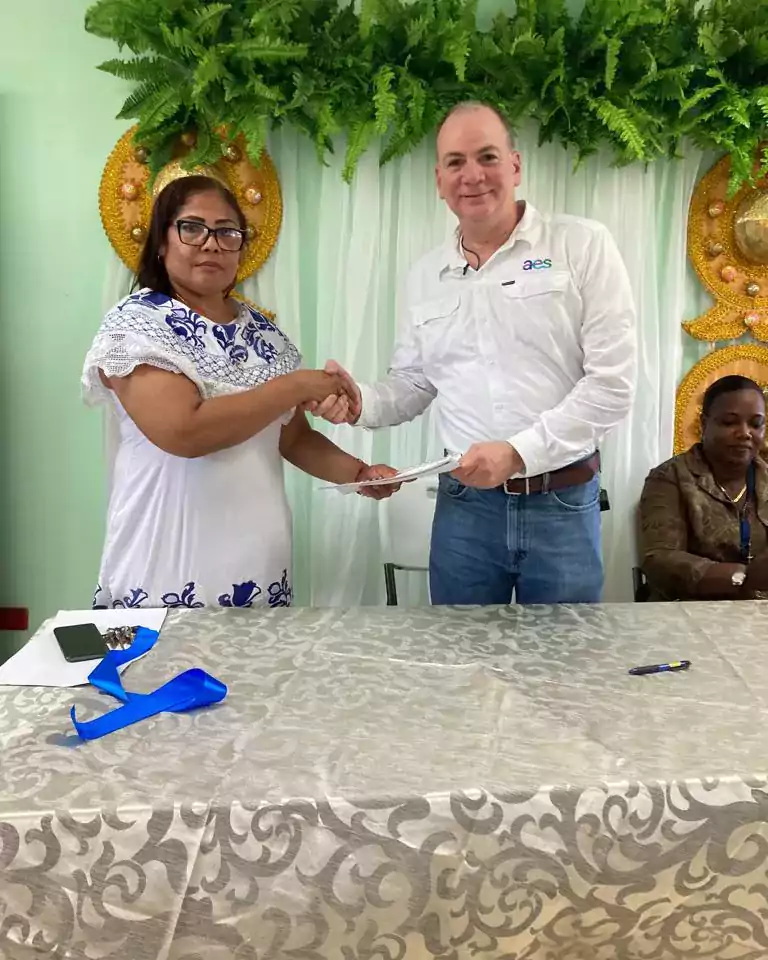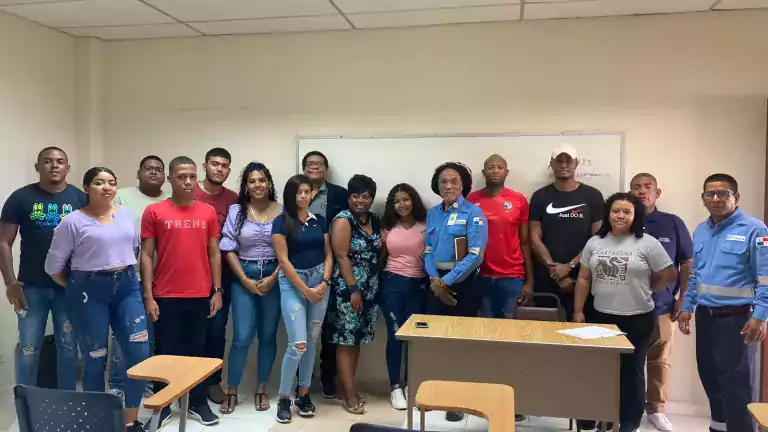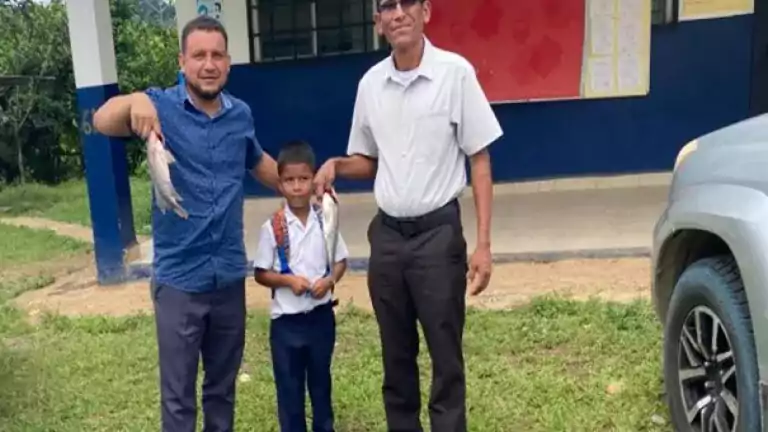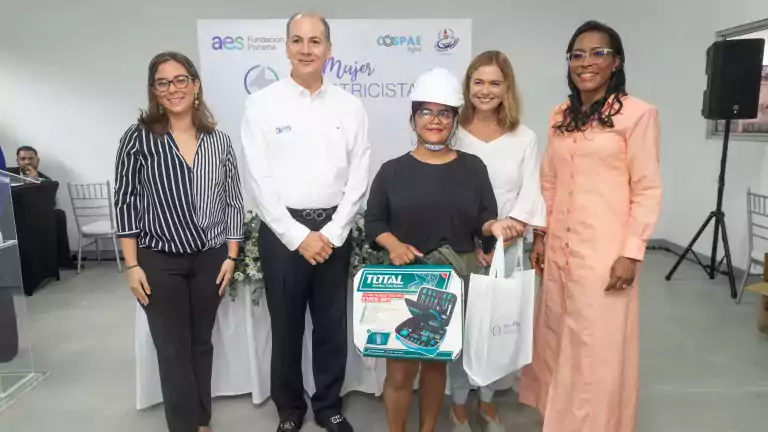
Proyecto: El Líder en Mí
Ubicación del Proyecto: Changuinola, Panamá
Área de Enfoque: Crecimiento Económico
Impacto: +524 niños de las comunidades de Bocas del Toro, Changuinola
Aliados: Escuela Nancé del Risco y The Greatness Center
La Escuela Nancé del Risco es la escuela pública local para el municipio de Nance de Riscó en Changuinola, vecina de la planta hidroeléctrica Changuinola I de AES Panamá. Es una escuela primaria que atiende a más de 524 niños de las comunidades vecinas.
La comunidad de Nancé del Risco ha sido nuestra aliada desde el inicio de nuestras operaciones en la región de Changuinola. El año pasado, inauguramos con orgullo el programa educativo El Líder en Mí, junto con nuestros socios la Escuela Nancé del Risco y Leadership Technologies, Inc.
El programa sigue los siete hábitos saludables de la reconocida empresa de coaching Franklin Covey. La metodología de El Líder en Mí ha sido probada en más de 4,000 centros educativos en todo el mundo y en centros educativos privados y oficiales en Panamá. El programa educativo El Líder en Mí apoya directamente el ODS 4 (Educación de Calidad), ya que tiene como objetivo capacitar a estos niños en habilidades blandas como el liderazgo y la empatía.
The project aims to:
- Positively impact the Nancé del Risco community through the transformation of the Nancé del Risco School into a school for leaders focused on principles that will contribute significantly to society through their participation in the program.
- Inspire agents of change in the community, with the school being the main pillar as part of the education transformation process.
- Contribute to comprehensive education in Panama and serve as a positive influence in the country.
- Guarantee outstanding results at the Nance del Risco School in the three focus areas: academic performance, leadership, and culture.
Project name: Preparándome con Energía
Project location: Colón Province, Panama
Sub focus area: Economic growth
Impact: 180 students from the Technological University of Panama, Regional Center of Colón
Partners: Technological University of Panama, Regional Center of Colón
The AES Panamá Foundation, together with the Technological University of Panama and through the Regional Center of Colón and a grant from the United States Department of State, developed the Preparing Myself with Energy program. The goal of the program is to provide additional tools to young people in the province of Colón so that they can access better job opportunities and contribute to the development of their families.
Miguel Bolinaga, President of AES Panamá, said, “‘Preparándome con Energía’ is a program that will help increase the number of young adults who receive training in new skills and technical skills in electricity, mechanics, and psychosocial skills. Additionally, they will be trained in the English language for six months, which will open broader job opportunities for them in multinational organizations.”


Project location: Panama
Sub focus area: Economic Growth
Impact: +500 children from communities neighboring our operations (Colón Province, Panama City, Bayano)
Partners: Ministerio de Educación (MEDUCA)
Energía Mágica is an educational project that focuses on teaching children about energy and sustainability in a fun and interactive way. The project is designed to introduce young students to concepts such as renewable energy, energy conservation, and climate change, using a combination of games, workshops, and hands-on activities with the goal of instilling in them a commitment to the environment and the responsible use of electrical energy.
This project aims to:
- Create a culture of awareness about the valuable resource of electricity and water.
- Educate children on how electrical energy is generated, transmitted, and distributed throughout the country to reach homes and businesses.
- Educate children on the safe use of electrical energy.
- Educate children on how to save electrical energy.
- Educate children about the different types of renewable energy and how AES Panamá is an example of the change towards the energy transition.

Project location: Changuinola, Panama
Sub focus area: Well-being, Health, and Safety of the Communities
Impact: 854 direct beneficiaries and 323 families, 3,659 tilapias to five study centers in Changuinola; which translates into 7,029.29 lbs of fish. The impacted schools are Nance de Riscó, Valle del Rey, Ojo de Agua, Bajo Gavilán and Bajo La Esperanza de Changuinola, located in the District of Cochigró, Changuinola.
Partners: Panamanian Ministry of Education (MEDUCA)
The Changuinola Hydrobiological Station is an activity carried out in the Environmental Impact Study of the Changuinola I Hydroelectric Power Plant, carried out for the study and reproduction of native fish from the Changuinola River (Boca Chica), since, with the construction of the hydroelectric dam, the fish could not make their way through the life cycle. https://www.aespanama.com/es/estacion-hidrobiologica
AES Panamá’s Changuinola Hydrobiological Station at our Changuinola I hydropower plant serves as a research and environmental work center to strengthen fish and shrimp populations in the upper basin of the Changuinola River. We initiated the Tilapia Growth and Fattenning Program to contribute to neighboring communities’ nutrition through access to safe and quality protein. The project aims to:
- Promote the sustainable development of communities neighboring the Changuinola I hydropower plant through the implementation of responsible aquaculture practices, which contribute to improving nutrition, food security and the empowerment of community members.
- Implement tilapia farming efficiently and sustainably to provide a reliable source of high-quality protein and essential nutrients to the local community.
- Implement aquaculture techniques that minimize environmental impact, such as efficient water use, proper waste management, and nutrient recycling through composting of tilapia waste.
- Raise awareness about the importance of fish in diet and educate the community about the nutritional benefits of consuming fish, especially tilapia.
- Ensure that the tilapia growth and fattening program benefits vulnerable groups in the community, such as women and youth, by offering equitable training and employment opportunities.
Project location: Panama City, Panama
Sub focus area: Economic Growth
Impact: 25 vulnerable women residents of Panama City
Partners: Don Bosco Technical Institute and Private Sector Council for Educational Assistance (COSPAE)
The AES Panamá Foundation leads the Soy Mujer Electricista (I Am an Electrician Woman) program where female residents of Panama City can strengthen skills and technical knowledge about electricity with the goal of expanding their opportunities for employability or entrepreneurship in the electrical sector. At the end of the program, the participants graduate with an electrician’s license in order to become working female electricians.
This program is aimed at young women between ages 18 – 25 years who have a technical bachelor's degree and are interested in acquiring theoretical and practical knowledge to carry out reliable, efficient, and safe electrical installations. Participants had the opportunity to train in residential electrical installations, industrial electricity, entrepreneurship, employability, interpretation of low voltage electrical plans, and life skills.
Miguel Bolinaga, President of The AES Panamá Foundation, said, “Our objective with the Mujer Electricista program in Panama is to open opportunities for young women to develop their potential and contribute new valuable perspectives. We recognize that gender diversity is essential for innovation and sustainable growth and that is why we promote these types of initiatives.”
This project contributes to SDG 4 (Quality Education) and SDG 5 (Gender Equality) since it provides vulnerable women the opportunity to become a professional electrician, a job position that has been traditionally male dominated.
The AES Panamá Foundation developed this program in collaboration with COSPAE (Private Sector Council for Educational Assistance) and the Don Bosco Technical Institute.
